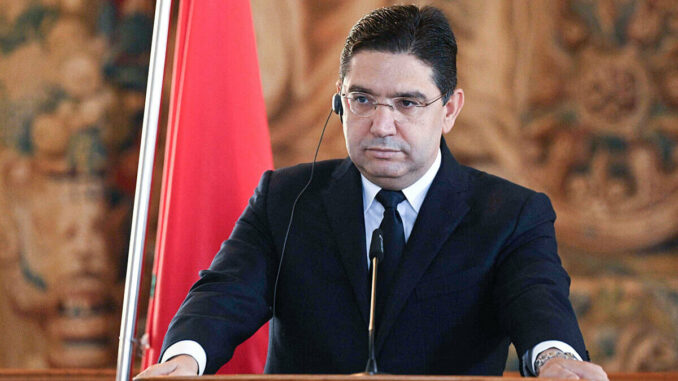
Morocco is not negotiating about its Sahara, nor about its sovereignty over this region, nor even less about its national unity. Rather the negotiation is about a regional conflict with a neighboring country, a reference to Algeria.
The remarks were made by Minister of Foreign Affairs in Rabat on Monday during a press briefing following talks with his Estonian counterpart Margus Tsahkna.
In response to a question on media reports about the proposal put forward by the UN Secretary General’s personal envoy for the Sahara, Staffan de Mistura, on the “partition of the Sahara”, Bourita said that “the Sahara, Morocco’s unity and territorial integrity have never been on the negotiating table, nor the subject of agreements or compromises.”
Morocco reiterated, in line with the instructions of King Mohammed VI, its clear position, already expressed in 2002, when the same idea was floated by the former UNSG personal envoy for the Sahara, James Baker, on a proposal from Algeria, Bourita recalled.
The Moroccan delegation, he went on, had informed de Mistura that “such ideas are rejected and are not discussed at all”, adding that Morocco has not accepted and will never accept such proposals which are at odds with the principled position of the Kingdom and all Moroccans on Morocco’s sovereignty over the Sahara, which is an integral and indivisible part of the Kingdom’s territory.
Discussing this topic, “Mr. de Mistura should have mentioned the source of this idea, the party that suggested it to him, and those who encouraged him to put it forward, as he presented it to us in April”, Bourita said, stressing that de Mistura should also have specified whether it was a personal initiative or that of certain parties who suggested that he reintroduce it.
The Envoy should also have revealed the underpinnings and logic that led these parties to suggest this idea to him or to resuscitate this stillborn proposal that was categorically rejected from the start, the minister pointed out.
The same applies, Bourita noted, to de Mistura’s remarks suggesting that the Kingdom should further develop and detail the Moroccan autonomy initiative while considering that it was time for Morocco to proceed with it.
In this regard, he stressed that the Kingdom’s position is clear and is structured around three points: the first is that the autonomy initiative is an outcome and not a starting point, while the second lies in the fact that this initiative enjoys increased support internationally, within the framework of the momentum driven by King Mohammed VI, and reflected in the opening of several consulates or the positions of the major powers, the European Union or other countries.
This initiative is considered by the international community as a framework to resolve this regional dispute, he asserted.
The third point is that “This initiative has its red lines, which are non-negotiable, although there is room for details in certain areas,” Bourita said, making it clear that the parameters of the autonomy plan can only be discussed when the other parties accept autonomy as a principle.
Bourita stated further that in the absence of a serious, clear and solemn commitment from the other parties in this process on the basis of the autonomy initiative, this kind of ideas “are not on the agenda and remain premature.”
Few hours after Morocco’s foreign minister denounced the obsolete and unfeasible option floated by De Mistura, the UN deputy spokesman Farhan Haq explained that division is no longer on the table and that autonomy is the “remaining option.”
